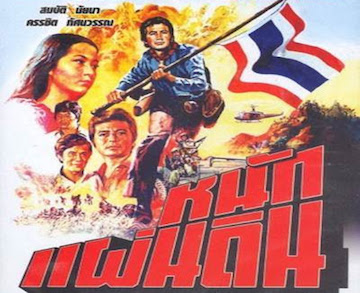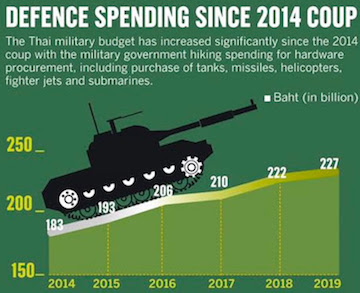

Army chief Apirat Kongsompong invoked arguably the darkest period in Thailand’s history earlier this week, when he recommended a song associated with violence and intolerance. At a press conference on 18th February, General Apirat was asked to comment on the Pheu Thai Party’s manifesto pledge to reduce military spending after the 24th March election. In response, he said that they should listen to หนักแผ่นดิน (‘burden of the land’). He then issued an order for military radio stations to play the song, though the directive was rescinded shortly afterwards.
หนักแผ่นดิน, composed by Boonsong Hakritsuk in 1975, denounces anyone not affirming their loyalty to the nation, religion, and monarchy as traitorous ‘scum of the earth’. This ultranationalist song fomented anti-Communist violence when it was repeatedly broadcast in the days before the 6th October 1976 massacre. In an editorial today, the Bangkok Post accuses Apirat of “reviving the most hateful song in Thai political history”.
The song was also the theme tune to a film of the same name, directed by Sombat Methanee in 1977. The Village Scouts, a paramilitary group that instigated the 1976 massacre, are the heroes in this anti-Communist propaganda movie, and หนักแผ่นดิน is their anthem. (Rachel V. Harrison discusses this and similar films in a chapter of Cultures at War.) Apirat’s invocation of หนักแผ่นดิน despite (or because of) its incendiary legacy sends a disturbing signal that the army has barely changed in the past forty years. (Apirat’s father, General Sunthorn, led the coup that resulted in the 1992 ‘Black May’ massacre. The apple didn’t fall far from the tree.)
Apirat’s resurrection of such a divisive song has overshadowed the issue of military spending that Pheu Thai highlighted. As The Nation reveals today, the military’s budget has increased by almost a quarter since the 2014 coup. Much of this money has been spent on sophisticated equipment that is largely redundant. (Paul Chambers and Napisa Waitoolkiat discuss military expenditure and corruption in Khaki Capital.)
หนักแผ่นดิน, composed by Boonsong Hakritsuk in 1975, denounces anyone not affirming their loyalty to the nation, religion, and monarchy as traitorous ‘scum of the earth’. This ultranationalist song fomented anti-Communist violence when it was repeatedly broadcast in the days before the 6th October 1976 massacre. In an editorial today, the Bangkok Post accuses Apirat of “reviving the most hateful song in Thai political history”.
The song was also the theme tune to a film of the same name, directed by Sombat Methanee in 1977. The Village Scouts, a paramilitary group that instigated the 1976 massacre, are the heroes in this anti-Communist propaganda movie, and หนักแผ่นดิน is their anthem. (Rachel V. Harrison discusses this and similar films in a chapter of Cultures at War.) Apirat’s invocation of หนักแผ่นดิน despite (or because of) its incendiary legacy sends a disturbing signal that the army has barely changed in the past forty years. (Apirat’s father, General Sunthorn, led the coup that resulted in the 1992 ‘Black May’ massacre. The apple didn’t fall far from the tree.)
Apirat’s resurrection of such a divisive song has overshadowed the issue of military spending that Pheu Thai highlighted. As The Nation reveals today, the military’s budget has increased by almost a quarter since the 2014 coup. Much of this money has been spent on sophisticated equipment that is largely redundant. (Paul Chambers and Napisa Waitoolkiat discuss military expenditure and corruption in Khaki Capital.)
